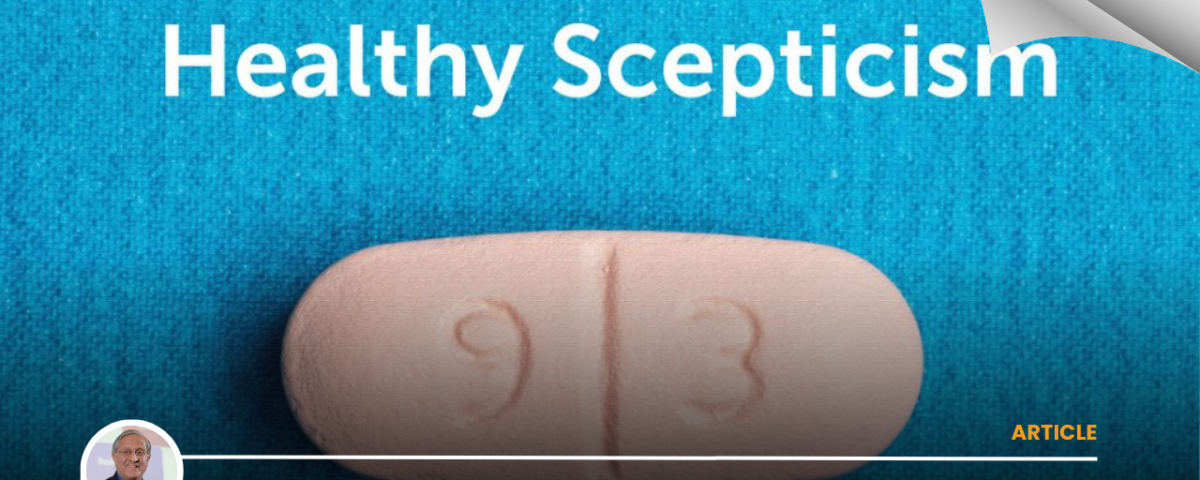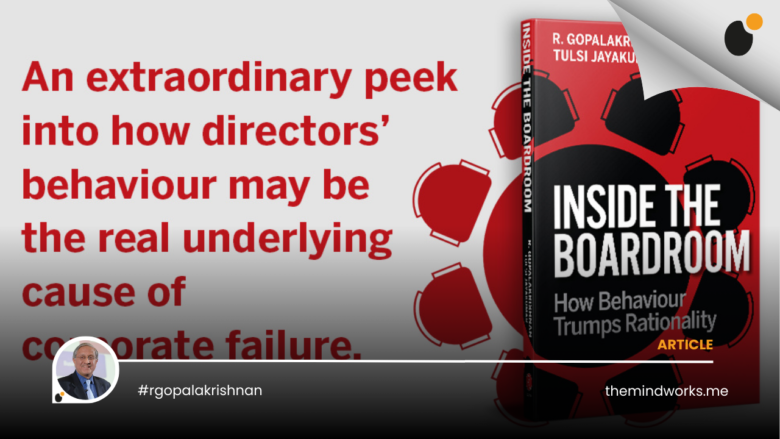To appear on 12-10-22
BS The Wise Leader (57)
The art of ‘healthy scepticism’
Independent directors add value to a company, not only through their explicit knowledge and cognitive skills, but also through their experiential intuition and heuristic skills.
By R Gopalakrishnan*
Joseph Jastrow was a Polish-American psychologist who lived in the first half of the 20th century. He is credited with the creation of a unique picture, which looked like a rabbit to some people, and like a bird to others. Many who saw the rabbit just could not see the bird even after being prompted to try. The converse was also true. This phenomenon has come to be called the Jastrow effect. In the public domain, you see the Jastrow effect being played out between two binary extremes — the left-liberal intellectuals versus the right-conservative votaries, for example, in the US, UK, Brazil, Hungary, Italy, and many more.
Some of the corporate misgovernance cases typify the Jastrow effect. A dangerously high risk-taking chief executive officer (CEO) is seen by some directors as a positive, while other directors may view the CEO as wild-eyed and crazy. Who can quantify how much risk is all right before descending into a malfeasance case? Even among the acknowledged cases of malfeasances, some perceive it as mens rea (bad intent) while others view the same as entrepreneurial misjudgment. When commentaries are written with hindsight, of course, both are clubbed together as heinous crimes by greedy businessmen.
Everywhere, enterprise is facing governance headwinds and, sometimes, even existential threats. These threats arise from executive flaws like excessive borrowing, leadership narcissism, bad strategy, and poor management or luck-of-the-draw (bad timing, incoherent customer value, unwarranted optimism). It is difficult to unarguably separate bad intent from misjudgment cases.
Looking abroad, Theranos and its founder, Elizabeth Holmes, have been much in the news. Credit Suisse is currently reported to be embroiled in scandals, spies, lies, and money laundering. Some years ago, two German companies hogged the headlines for disreputable reasons—Volkswagen (Dieselgate) and Wirecard. India has also had, and continues to identify, its share of suspect entrepreneurs. Since they are familiar to Indian observers, they do not bear repetition here.
Several such cases had stellar directors. Theranos tops the list with global luminaries like Henry Kissinger, George Shultz, and General James Mattis. The Washington Post bemoaned that these Theranos directors paid no price for Ms Holmes’ fraud. There are cases, like Satyam, where the CEO lied blatantly, or hid facts, and there, independent directors argued that it was very difficult for them to sense wrongdoing.
Independent directors add value to a company, not only through their explicit knowledge and cognitive skills, but also through their experiential intuition and heuristic skills. This is easier said than practised. In one case involving the termination of a CEO, I had to work patiently and extra-time to assemble the facts. Independent directors must develop healthy scepticism, which is born out of curiosity and is quite different from suspicion, which is born out of predisposition or biases. A healthy dose of scepticism adds value to boards.
It takes dogged effort to unearth facts and proof. Ask journalist John Carreyrou of The Washington Post in the Theranos case, or prominent Indian journalist Sucheta Dalal, who unearthed several security markets scams—Harshad Mehta, Ketan Parekh, NSE co-location, and DHFL. Such investigations required healthy scepticism, which probably converted into suspicion at some stage.
Misgovernance cases teach directors that doing nothing about smoke signals is not an option. Healthy scepticism is a virtue. It is a fundamental tenet of science. As Niels Bohr paraphrased, “The opposite of a truth is not a falsehood. It may well be another truth.” Philosophy states that everything is interconnected, while yet being separate. This is the premise of karma. Every action has an effect, and both find entry in the “account book” and show up when the accounts are tallied. The Nobel winners for physics this year propounded the theory of “quantum entanglement,” whereby two particles are linked regardless of the space between them. To my simple mind, this is like the butterfly effect in chaos theory, whereby a small change in one state can result in a large effect on another state.
In a similar manner, a company is an entanglement of various mutations and transactions. Malfeasance is one end of the spectrum of corporate character, the other end being leadership authenticity. Authentic leadership is about transparency and fairness.
Recently The Guardian reported on a new fish discovery picturesquely– “barreleye fish gaze upwards through their transparent heads with eyes like mesmerizing orbs.” That is how corporate leaders need to be: Gazing upwards with transparent heads like barreleye fish! In an inspiring interview, outgoing CEO, Grant Reid, of Mars, the makers of chocolate brands and pet foods, has described how Mars has become less opaque with changing times, all in a planned and conscious manner. Yves Chouinard of Patagonia has placed his entire shareholding in a trust dedicated to mitigating climate change.
If you are a director of a reckless company, your being there is questionable. If you are a director of an authentic company, you are fortunate. In the large spectrum of in-between companies, directors need to exercise healthy scepticism using the tools of science—observe, hypothesise, experiment, and repeat the cycle till a truth emerges.
*The writer is an author and a business commentator. His articles and videos can be accessed at his website www.themindworks.me and his email ID is rgopal@themindworks.me



